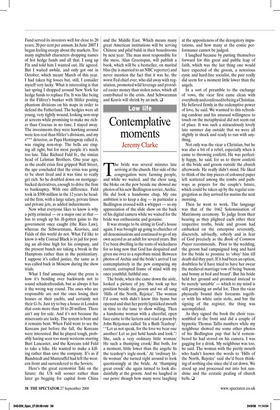Contemplative moments
Jeremy Clarke
The bride was several minutes late arriving at the church. Her side of the congregation were farming people, and while we waited, and the choir sang, the bloke on the pew beside me showed me photos of his new Bedlington terrier, Archie. He did look a handsome chap. My one ambition is to keep a dog — in particular a Bedlington crossed with a whippet — so my appreciation of the slide show on the back of his digital camera while we waited for the bride was enthusiastic and genuine.
It was strange to be sitting in God’s house again. I was brought up going to churches of all denominations and continued to go of my own accord as an adult for several years. But I’ve been dwelling in the tents of wickedness for so long now that God has despaired and given me over to a reprobate mind. Between photos of Archie and the bride’s arrival I sat contemplatively in the pew comparing my current, corrupted frame of mind with my once youthful, faithful one.
The bride, when she came down the aisle, looked a picture of joy. She took up her position beside the groom and we all sang ‘Hills of the North, Rejoice’. The woman I’d come with didn’t know this hymn but opened and shut her pretty lipsticked mouth in time to the tune to show willing. Then a handsome woman with a cheerful, open face came to the lectern and read a poem by John Betjeman called ‘In a Bath Teashop’. ‘ “Let us not speak, for the love we bear one another/ Let us just hold hands and look.”/ She, such a very ordinary little woman/ He such a thumping crook/ But both, for a moment, little lower than the angels/ In the teashop’s ingle-nook.’ At ‘ordinary little woman’ she turned right around to look questioningly at the bride. At ‘thumping great crook’ she again turned to look disdainfully at the groom. And we laughed in our pews: though how many were laughing at the appositeness of the derogatory imputations, and how many at the comic performance cannot be judged.
I laughed because by putting themselves forward for this great and public leap of faith, which was the last thing one would have expected of the groom, a notorious cynic and hard-line socialist, the pair really did seem for a moment little lower than the angels.
In a sort of preamble to the exchange of vows, the vicar first came clean with everybody and confessed to being a Christian. He believed firmly in the redemptive power of love, he said. We warmed to this refreshing candour and his unusual willingness to touch on the metaphysical did not seem out of place. It was such a miraculously lovely late summer day outside that we were all slightly in shock and ready to run with anything.
Not only was the vicar a Christian, but he was also a bit of a rebel, especially when it came to throwing confetti. He was perfectly happy, he said, for us to throw confetti at the bride and groom outside the church afterwards. He really didn’t mind. He liked to think of the tiny pieces of coloured paper left scattered among the tombs and pathways as prayers for the couple’s future, which could be taken up by the regular congregation as they arrived for matins the next morning.
Then he went to work. The language was that of the 1662 Solemnisation of Matrimony ceremony. To judge from their bearing as they plighted each other their respective troths, bride and groom had embarked on the enterprise reverently, discretely, advisedly, soberly and in fear of God precisely as the Book of Common Prayer recommends. Prior to the wedding, the groom had campaigned long and hard for the bride to promise to ‘obey’ him till death did they part. If it had been an option, doubtless he’d have tried to have her swear the medieval marriage vow of being ‘buxom and bonny at bed and board’. But his bride held her ground and promised instead to be merely ‘amiable’ — which to my mind is still promising an awful lot. Then the vicar physically bound their forearms together with his white satin stole, and bar the signing of the register, the thing was accomplished.
As they signed the book the choir reassembled at the front and did a couple of hypnotic Thomas Tallis numbers while my neighbour showed me some other photos of his Bedlington pup that he’d remembered he had stored on his camera. I was gagging for a drink. My neighbour was too, he said. The woman with the pretty mouth who hadn’t known the words to ‘Hills of the North, Rejoice’ said she’d been thinking of nothing else since she’d sat down. We stood up and processed out into hot sunshine and the ecstatic pealing of church bells. ❑










































































 Previous page
Previous page